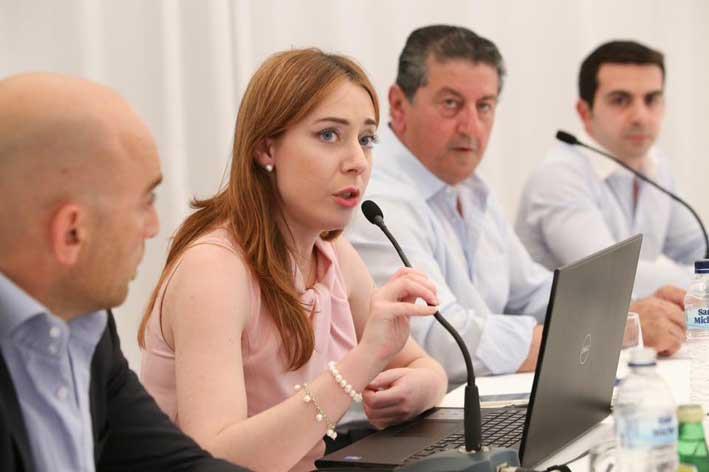Maltese private sector enterprises are currently experiencing a human resources crisis as a result of the country’s low unemployment numbers, the GRTU Malta Chamber of SMEs CEO Abigail Mamo told The Malta Independent on Sunday.
Ms Mamo stressed the dire situation in which businesses find themselves, with some even having to resort to ‘off the books’ employment of third-country nationals, such as those who, for example, hold an Italian work permit but not a Maltese one. In such cases, she explained, the employers are having to put themselves in a precarious position as they pay their workers well above the minimum wage anyway, but are themselves legally exposed. “Business owners are asking for these workers to be regularised or for help in finding employees”.
Unfortunately, she did not have any statistics available, explaining that as far as she knows, the only official statistics relate to employment and unemployment, not to unfilled vacancies and these can be compiled by Jobs+ as the national employment agency, but then again they would only know about the vacancies notified to them.
“This is, however, a significant problem, which we are facing daily,” Ms Mamo said. She explained that most of the people being found to fill these jobs are third country nationals, yet this brings with it a spate of problems. “When looking for non-Maltese workers – given that the Maltese are not filling lower-skilled positions – the next preference for businesses is EU nationals, but not many are being found, as EU nationals can move around freely and tend to go to countries which offer the best wages.”

With third-country nationals, enterprises hit a bureaucratic obstacle course, she said. “You need to deal with Identity Malta as a main authority but the application is scrutinised also by Jobs+ and the police, who do their own checks. Qualifications and work experience also come into play, as the authorities will want to check these. Problems arise when silly mistakes on applications occur, which is quite often, and permission will not be given due to this. What we have done is create a contact point with each of the authorities and we follow the application on behalf of our members to try and fast-track the applications. Then, if there is a silly reason for the application getting stuck, we push it forward. One basic reason why applications get blocked is because employers are required to advertise a job in Malta first, which is obvious, but some fail to do so.”
For each vacancy they submit, adverts have to be placed in newspapers, and both the employers and the authorities know they will not find anyone locally to fill the vacancy. This is time-consuming and costly, especially for employers who need many workers and have a high turnover.
“Businesses have told me that they go to the Employment and Training Commission, who will not be able to find anyone to fill the position, so why then are they obliged to advertise it? They say that if they have already gone to the ETC, isn’t that enough to show that they have obviously already looked locally?”

It’s a combination of the process being overly bureaucratic and things that are slightly useless, prolonging the process. The situation became a serious problem around two years ago, and over the past year it has been extremely bad, Ms Mamo said.
She told this newsroom that the bureaucracy in employing third-country nationals needs to be relaxed. “We are not saying just bring anyone in, of course, but businesses need a breather.
“There are certain businesses that don’t have the manpower to open new outlets, even though they want to. Nowadays, such applications take months. Now, imagine you are running a business, and seriously need more staff. You find someone who wants to work and you need to apply and spend months waiting to see if the application will even be approved. These workers could find jobs elsewhere or leave the country. The fact is that such applications are still more likely to be refused than approved.

“We went through a time where every third country national application was automatically refused. This changed after a lot of pressure was made by the business community and the GRTU.”
Ms Mamo described the situation as it was in the past, where people who wanted to work as cleaners would not be required to submit any work experience documents. Some operators, however, who were having problems with the bureaucratic process, had officially employed people as cleaners who would really be doing other work, because the process was faster. This is illegal, of course, and the authorities realised what was happening. But the way they tackled the problem was to require the presentation of credentials even for jobs as cleaners.
Turning to management level positions, similar human resource problems are being observed. The GRTU CEO told this newsroom that university students are being approached before they graduate in order for them to take up jobs once they graduate. “This shows how bad the situation is. When we were debating our budgetary proposals, we said that the human resources aspect is the biggest challenge facing businesses today.”
Asked whether businesses have reached the situation where some will have to close due to them being unable to find employees, she said that, luckily, that stage has not yet arrived. “The problem facing enterprises is that, for example, they cannot expand, and so whereas in the past they would have tendered for a contract, now they are unable to do so.”
Asked whether some businesses would have to close down if the situation was still the same five years down the line, she said: “God forbid that the situation remains the same. What is certain is that the country will lose a lot in terms of taxes due to off-the-books employment and a contracting business sector.”
Asked if she has any recommendations, apart from relaxing bureaucracy, Ms Mamo said: “We told the government that their responsibility does not stop with ensuring low unemployment levels. Their job is to ensure that the economy grows and to find a way to make it easier for businesses to employ people. We told the government that it can help resolve this issue more easily than we can due to their dealings with foreign governments and contacts with other national employment agencies.
“The government can and should encourage businesses to employ hard-working people that will probably cause the least trouble. Imagine that you have a Maltese business and you have sought local employees but failed, sought EU employees and failed, where do you go next? What doors can you knock on?”
According to the National Employee Skills Survey carried out during the first quarter of 2016, vacancies for craft and related trade workers, professionals, technicians and service/sales workers take the longest to fill, with respondents having at that time claiming that some of these positions take more than eight weeks to be filled.

Cross-sector problems
The responses from some employers fit this particular time frame, while others told this newsroom that it takes much longer, as they are unable to find either local or EU workers in Malta.
A source in the entertainment industry points out that the hours of work when it comes to pubs and restaurants puts many Maltese off. He said that third-country nationals are usually found doing such work, however the process involved when it comes to hiring them is very long. He remarked that the process appears to take less time for hoteliers.
Restaurateur Matthew Pace, managing director of Uncle Matt’s Kitchen, said that human resources is currently a major problem in the restaurant business. “It’s not filling the post that’s the problem, but rather the person you fill the post with. In the service industry, you need to offer good service consistently.”
He said that there are very few Maltese going into the sector, and hinted that the same can be said about EU nationals in Malta. This, he explained, results in restaurateurs having to look outside the EU, mentioning Serbia and other non-EU Eastern bloc countries. The problem here, he explained, is the length of time it takes to process the visas and work permits for these foreign nationals; from his personal experience, the registration process takes on average around three or four months for a Serbian national. Since business in Malta is doing well, he said, most Maltese look to other sectors for work.
He believes that certain EU countries, where wages are lower, should be targeted to attract EU nationals to Malta to help fill vacancies. The problem is not just at ground level, he said, but also at managerial level. “I’m working on a project and want around eight outlets, but I can’t find the right staff for the posts.”
A source within the bespoke steel, glass and wood industries is also experiencing problems. “I was considering expanding my business as it has potential, but I gave up around a year ago because I couldn’t find staff. Existing employees know that employers are unable to find workers and use this knowledge to get a better deal.
“There just aren’t any Maltese who want to work in this industry. I even went to a few Ministries and asked them to help me find someone to work for me. They would check their computer and give me a few names, but these people did not want to work anywhere back then.”
He too complained about the length of time and the procedure involved in bringing over third-country nationals, saying that it had taken him a year to bring over one foreigner. He also spoke of other businesses in Malta having to resort to employing people ‘off the books’ because the procedure takes so long.
“The government truly has no idea how many people are being employed off the books in Malta. We can’t keep on like this.”
He said that the government should look into ways of making it easier to bring over third-country nationals because it is becoming too hard to find Maltese and EU citizens with the skills-set for certain sectors.
Maltese people who are being trained in skills required in his sector, he said, tend to go and work on oil rigs. “Another problem is that you accept a student from MCAST, train them, and then they leave you after a year. It’s not worth it.”
He pointed out that when you are tendering for work, you do not do it for just one contract, you apply for two or three. Then, if you are awarded more than one contract, you may well have to hire additional people for that job. Once you have actually won the contract, you are given a completion date and if you do not finish the work by that date, you pay a daily fine. Due to the problems in finding employees, some companies have had to cut down on the number of tenders they submit.
This newsroom also spoke to a high-end retailer who said that it is easy to find part-time employees, but not full-timers. Most employees are non-Maltese EU nationals, or third-country nationals, she said, mentioning the problems involved in bringing third-country nationals to Malta. Asked how long it takes her company to fill a vacancy, she said that it can take up to three months, and at managerial level the time required is even longer. She also said that Sunday trading would make the situation worse, as not many people would want to work on Sundays and she is against the concept.
Even the private transport sector is struggling to find employees. One private transport business owner said that the situation has become so bad that companies in this area have resorted to poaching drivers. The drivers, of course, use this to their advantage, because if the boss does something that upsets them, they will just change company, he said.
Another issue, the private transport entrepreneur explained, is that if they bring in people from outside the EU to work as coach drivers, in addition to a work permit and the usual procedures, they are also required to retake their driving test to acquire an EU driving licence.
Manuel Azzopardi, from Queens Dry cleaners, said that Malta desperately needs some form of training facility in Malta, where potential employees would undergo a course in sewing. He said that his type of business deals with wedding dresses, evening gowns, etc. “It’s hard to find local people to employ, and so we bring in foreigners, but they have no idea what to do. They try, but we don’t have the time to train them. “We focus on domestic dry-cleaning, and honestly we could do with two more employees, business is so good,” he said.